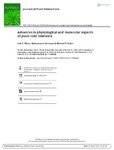Advances in physiological and molecular aspects of plant cold tolerance
| dc.contributor.author | Rihan, Hail | |
| dc.contributor.author | Al-Issawi, M | |
| dc.contributor.author | Fuller, MP | |
| dc.date.accessioned | 2018-01-09T20:46:43Z | |
| dc.date.available | 2018-01-09T20:46:43Z | |
| dc.date.issued | 2017-03-31 | |
| dc.identifier.issn | 1742-9145 | |
| dc.identifier.issn | 1742-9153 | |
| dc.identifier.uri | http://hdl.handle.net/10026.1/10527 | |
| dc.description | peerreview_statement: The publishing and review policy for this title is described in its Aims & Scope. aims_and_scope_url: http://www.tandfonline.com/action/journalInformation?show=aimsScope&journalCode=tjpi20 | |
| dc.description.abstract |
Abiotic stress is one of the main causes of crop reduction globally. Among the different abiotic stresses, cold is an essential factor that limits crop productivity worldwide. Low temperature affects the growth, development and distribution of agronomic species throughout the world. Cold stress is a serious threat to the sustainability of crop yields. Indeed, cold stress can cause major crop losses. A significant number of researches have been reviewed and discussed in this study in order to improve the understanding of the physiological and genetic nature and function of plant cold tolerance. Recent developments in determining the mechanism of genes with roles in freezing tolerance and the systems involved in low-temperature gene regulation and signal transduction are described. The roles of a family of Arabidopsis transcription factors, the CBF/DREB1 proteins, have been described and its role in controlling the expression of a regulon of cold-induced genes (COR) that increase plant freezing tolerance has been explained. Moreover, this study has reviewed the recent application applied to improve the cold tolerance of plants such as molybdenum. The use of infrared camera to study the process of plant injuries caused by low temperature has also been reviewed. | |
| dc.format.extent | 143-157 | |
| dc.language | en | |
| dc.language.iso | en | |
| dc.publisher | Informa UK Limited | |
| dc.subject | Cold tolerance | |
| dc.subject | CBF/DREB | |
| dc.subject | COR genes | |
| dc.subject | infrared thermography | |
| dc.subject | ABA | |
| dc.title | Advances in physiological and molecular aspects of plant cold tolerance | |
| dc.type | journal-article | |
| dc.type | Journal Article | |
| plymouth.author-url | https://www.webofscience.com/api/gateway?GWVersion=2&SrcApp=PARTNER_APP&SrcAuth=LinksAMR&KeyUT=WOS:000398175000004&DestLinkType=FullRecord&DestApp=ALL_WOS&UsrCustomerID=11bb513d99f797142bcfeffcc58ea008 | |
| plymouth.issue | 1 | |
| plymouth.volume | 12 | |
| plymouth.publication-status | Published | |
| plymouth.journal | Journal of Plant Interactions | |
| dc.identifier.doi | 10.1080/17429145.2017.1308568 | |
| plymouth.organisational-group | /Plymouth | |
| plymouth.organisational-group | /Plymouth/Faculty of Science and Engineering | |
| plymouth.organisational-group | /Plymouth/Faculty of Science and Engineering/School of Biological and Marine Sciences | |
| plymouth.organisational-group | /Plymouth/REF 2021 Researchers by UoA | |
| plymouth.organisational-group | /Plymouth/REF 2021 Researchers by UoA/UoA06 Agriculture, Veterinary and Food Science | |
| plymouth.organisational-group | /Plymouth/Users by role | |
| plymouth.organisational-group | /Plymouth/Users by role/Academics | |
| dcterms.dateAccepted | 2017-03-15 | |
| dc.identifier.eissn | 1742-9153 | |
| dc.rights.embargoperiod | Not known | |
| rioxxterms.versionofrecord | 10.1080/17429145.2017.1308568 | |
| rioxxterms.licenseref.uri | http://www.rioxx.net/licenses/all-rights-reserved | |
| rioxxterms.licenseref.startdate | 2017-03-31 | |
| rioxxterms.type | Journal Article/Review |


